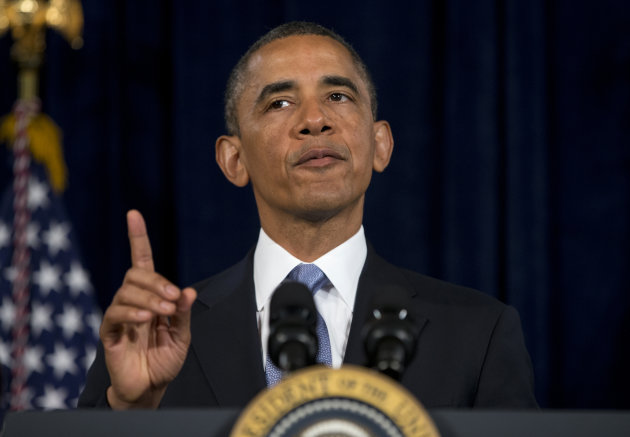WASHINGTON (AP) — It's called the Affordable Care Act, but President Barack Obama's health care law
may turn out to be unaffordable for many low-wage workers, including
employees at big chain restaurants, retail stores and hotels.
That might seem strange since the law requires medium-sized and large employers to offer "affordable" coverage or face fines.But what's reasonable? Because of a wrinkle in the law, companies can meet their legal obligations by offering policies that would be too expensive for many low-wage workers. For the employee, it's like a mirage — attractive but out of reach.
The company can get off the hook,
say corporate consultants and policy experts, but the employee could
still face a federal requirement to get health insurance.
Many are expected to remain uninsured, possibly risking fines. That's
due to another provision: the law says workers with an offer of
"affordable" workplace coverage aren't entitled to new tax credits for
private insurance, which could be a better deal for those on the lower
rungs of the middle class.Some supporters of the law are disappointed. It smacks of today's Catch-22 insurance rules.
"Some people may not gain the benefit of affordable employer coverage," acknowledged Ron Pollack, president of Families USA, a liberal advocacy group leading efforts to get uninsured people signed up for coverage next year.
"It is an imperfection in the new law," Pollack added. "The new law
is a big step in the right direction, but it is not perfect, and it will
require future improvements."
Andy Stern, former president of the Service Employees International Union,
the 2-million-member service-sector labor union, called the provision
"an avoidance opportunity" for big business. SEIU provided grass-roots
support during Obama's long struggle to push the bill through Congress.
The law is complicated, but essentially companies with 50 or more
full-time workers are required to offer coverage that meets certain
basic standards and costs no more than 9.5 percent of an employee's
income. Failure to do so means fines for the employer. (Full-time work
is defined as 30 or more hours a week, on average.)But do the math from the worker's side: For an employee making $21,000 a year, 9.5 percent of their income could mean premiums as high as $1,995 and the insurance would still be considered affordable.
Even a premium of $1,000 — close to the current average for employee-only coverage — could be unaffordable for someone stretching earnings in the low $20,000's.
With such a small income, "there
is just not any left over for health insurance," said Shannon Demaree,
head of actuarial services for the Lockton Benefit Group. "What the
government is requiring employers to do isn't really something their low-paid employees want."
Based in Kansas City, Mo., Lockton is an insurance broker and
benefits consultant that caters to many medium-sized businesses affected
by the health care law. Actuaries like Demaree specialize in cost
estimates.Another thing to keep in mind: premiums wouldn't be the only expense for employees. For a basic plan, they could also face an annual deductible amounting to $3,000 or so, before insurance starts paying.
"If you make $20,000, are you really going to buy that?" asked Tracy Watts, health care reform leader at Mercer, a major benefits consulting firm.
And low-wage workers making more than about $15,900 won't be eligible
for the law's Medicaid expansion, shutting down another possibility for
getting covered.It's not exactly the picture the administration has painted. The president portrays his health care law as economic relief for struggling workers.
"Let's make sure that everybody
who is out there working hard and doing the right thing, that they're
not going to go bankrupt because they get sick, that they're going to
have health care they can count on," Obama said in a Chicago appearance last summer during the presidential campaign. "And we got that done."
White House senior communications
advisor Tara McGuinness downplayed concerns. "There has been a lot of
conjecture about what people might do or could do, but this hasn't
actually happened yet," she said. "The gap between sky-is-falling
predictions about the health law and what is happening is very wide."
The administration believes "most businesses want to do right by
their employees and will continue to use tax breaks to provide quality
coverage to their workers," she added. Health insurance is tax
deductible for employers, and the health law provides additional tax
breaks to help small businesses.Virtually all major employers currently offer health insurance, although skimpy policies offered to many low-wage workers may not meet the requirements of the new law. Companies affected have been reluctant to telegraph how they plan to comply.
"It clearly isn't going to be a morale-boosting moment when you redo your health plan to discourage participation," said Stern, the former labor leader, now a senior fellow at Columbia University. "It's not something most want to advertise until they are sure it's the right decision."
The National Retail Federation's top health care expert said there's no "grand scheme to avoid responsibility" among employers. "That is a little too Machiavellian," said Neil Trautwein.
Nonetheless, he acknowledged it's "a possible outcome" that low-wage workers could find coverage unaffordable because of the wrinkle in the law.
It might have turned out differently, added Trautwein, if Democrats had followed traditional congressional practice and taken the House and Senate versions of the bill to a conference committee. They could have worked out such quirks. But leaders determined that path was fraught with political peril after Democrats lost their 60-vote Senate majority in 2010.
"I can't help but thinking, they would have figured out a few more of these corners that don't meet," Trautwein said. http://news.yahoo.com/coverage-may-unaffordable-low-wage-workers-151922273.html





No comments:
Post a Comment